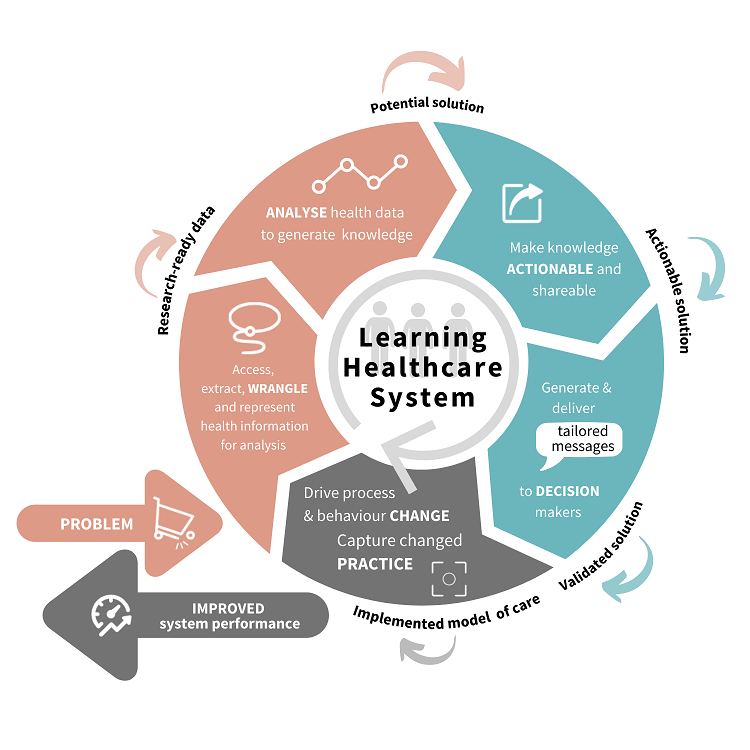The Applied Learning Health Systems Short Course
| Instructors | Topics and dates |
|---|
Become a part of the digital transformation of health
Do you want to learn to use health data to inform clinical practice and/or design and validate digital health-enabled models of care?
The Applied Learning Health Systems short course is a national multi award-winning program.
This is a 13-week online short course on Learning Health Systems. Express your interest for July 2024 below. Registrations will open in June and you will be notified. Live Zoom sessions will run from 6:30-9:00 PM on a weeknight. Full schedule available here. Places are limited.
This course will support you in developing and implementing digital health innovations to improve health systems, clinical decision making and healthcare quality in your organisation.
If you are interested in earning University credit points for this course, enrol in it as a single subject, as an elective subject in a variety of Masters degrees, or as a core subject in the Professional Certificate and Graduate Certificate in Digital Transformation of Health. Find out more about the courses here.
What you will learn

You will gain the fundamental knowledge and skills in digital health and clinical informatics, that you need to apply the Learning Healthcare System approach to practice improvement. Learn more here.
The small group work has been fantastic, providing a rare opportunity to meet a wide variety of interesting people working in the health sector. Sarah Finlayson, Quality Coordinator for Mental Health, Albury Wodonga Health

Course outline
The course will involve a series of modules that build on each other to provide an overview of all the steps required in an effective learning health system cycle. Pre-class learning will include a range of online, interactive learning and application activities developed by the instructors. In-class learning will involve hands on, guided workshops by instructors and group work using a variety of tools and software to interrogate the data and develop digital health solutions.
- Gain hands-on experience by working through the phases of a Learning Healthcare System
- Immediately apply your new knowledge to your workplace
- In teams, meet and learn from other participants in a variety of roles (e.g., clinicians, managers, data scientists), countries (Malaysia and Australia) and organisations (small and large, metro and regional, hospitals, GPs, and public health)
- Learn from world-class instructors and subject matter experts
- Gain broad experience by stepping through a case scenario spanning 10 years - letting you practise with real Australian healthcare data and virtual care apps as you consider how these models can evolve over time
- Explore what is next for you and your role in digital health.
Overall, really enjoyable and time just flies - even after a busy and intense day of seeing patients. 2021 Pilot student
What is a digital health-enabled Learning Health System?
The Learning Health System (LHS) approach aims to streamline improvements to individual and population health, by bridging the evidence-to-practice gap. Patients and clinicians can use the model to build evidence collaboratively and apply it to innovation, quality and safety and to create value in health care.
The foundations of a LHS are approaches in health informatics, design-thinking, implementation science, public health, and health services, which together can drive the digital transformation of a healthcare system.

Key features applied to the course
- Data 2 Knowledge (D2K). Use data to generate new knowledge. You will learn what it takes to access, collect, and analyse (using machine learning) health care data to build predictive models. You will try out machine learning approaches on real Australian healthcare data (i.e., BioGrid).
- Knowledge 2 Practice (K2P). Use knowledge to inform practice. You will learn co-design, prototyping, ideation, and workflow principles and apply them to a real Australian virtual care model (i.e., Datos and a Diabetes patient care app).
- Practice 2 Data (P2D). Change practice to measurably transform services and outcomes. You will learn how to implement and evaluate new digital technologies and strategise how to transform clinical workflows.
What are the prerequisites?
There are no formal prerequisites, but participants should be ready to engage with online material and participate in Zoom workshops.
- Strong interest in the topic and commitment to complete the course and engage in real-time sessions
- No programming experience or healthcare expertise required
- Counts for 20 CHIA CPD points.
Who is the course designed for?
Anyone who has an interest in healthcare data and utilising it to improve the healthcare system.
- All Clinicians
- All Allied Health Professionals
- Public Health Professionals
- Epidemiologists
- Researchers
- Data Scientists/Analysts
- Bioinformaticians
- Information technologists
- Government/Management representatives
I have already started to apply the principles and knowledge that I have learnt to real world situations. Geoff Hebbard, Director, Gastroenterology and Hepatology, The Royal Melbourne Hospital

Fees apply -
- $2200 for senior hospital medical staff with CME budget
- $1500 for others
- $1125 Unimelb Staff/Students
- International - submit an inquiry
- Group discounts available - 15% per person (5-9 participants), 30% per person (>10 participants)
Contact Sat Dushyanthen if you have any questions about the course, or any payment queries.